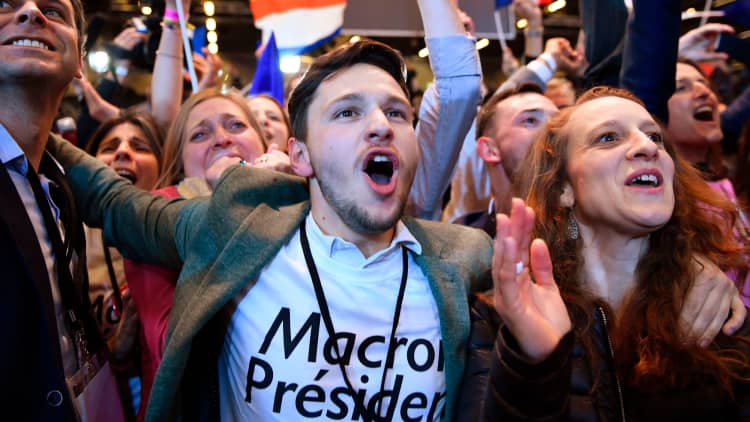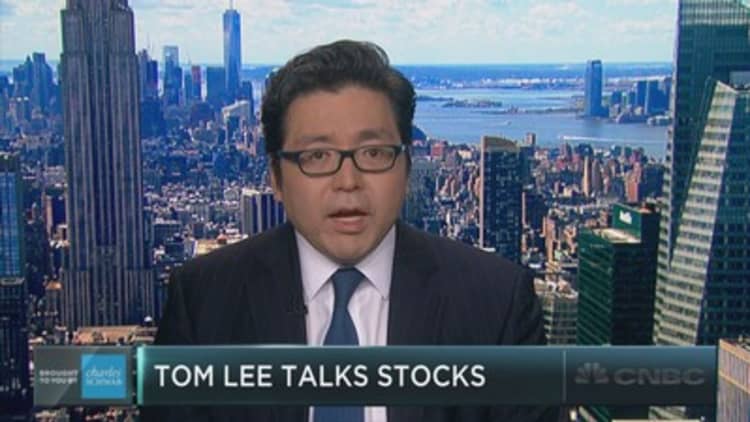
Relief over the French election sparked a global rally in stocks Monday, whacked safety trades in gold and bonds and rejuvenated some of the pro-growth Trump trade.
But traders don't see smooth sailing ahead for the bull market just yet.
The rally drove U.S. stocks sharply higher, with traders now watching for new all-time highs. The was up 1 percent in midday trading, off earlier highs, and about 30 points below its record of 2,400.
The French CAC 40 closed up more than 4 percent, and the German DAX surged more than 3 percent to an all-time high. Emerging markets were also winners, with the iShares MSCI Emerging Markets ETF up 1.5 percent.
"We want to see this week if the pattern continues," said Quincy Krosby, market strategist at Prudential Financial. "You have [President Donald Trump's] promise of a 'massive' tax reform. The market wants ... a little more on the detail, a little more on the timing. The government shut-down discussions are in the headlines ... and the geopolitical headlines could pop up at any time. For now, until we get closer to May 7, when we have the [French election] final round, the market is rejoicing."
The euro was one of the big winners, temporarily hitting a high of 1.10 overnight to the dollar, as investors looked at the outcome of the first round of the election as a positive for the single currency. Centrist Emmanuel Macron, a former economy minister, looked set to win against Marine Le Pen, the far-right candidate, who also made it into the finals.
"I think it's more a risk-friendly environment for the time being. There are other concerns out there, but the European story was important. You've established a slightly higher euro-dollar range and created a somewhat more friendly risk environment," said Alan Ruskin, G-10 foreign exchange strategist at Deutsche Bank.
Ruskin said the concerns for the euro and so-called risk rally include the rising tensions with North Korea, as well as Washington's efforts to pass a budget resolution by the Friday deadline to keep the government running. Both could become issues for markets fairly quickly. On Tuesday, North Korea celebrates its Army Day, and there is
Also, if Congress fails to adopt a budget resolution, analysts say it would be an immediate negative for the dollar and stocks and a positive for
"What we can be confident in is Macron will be the next president of France. We still don't know about policy and we don't know about the makeup of Parliament," said Marc Chandler, chief foreign exchange strategist at Brown Brothers Harriman. "This is the third European election where the national populist didn't win." The far right lost in Netherlands and Austria in recent elections.
Chandler said the markets were reading a broader message from the results, where four main candidates split the vote but Macron led with 23.7 percent and Le Pen was second with just under 22 percent. "There's not necessarily a major disruption of globalization coming from the political realm in Europe," said Chandler.
"One of the important issues is the [political] center is holding," said Chandler. He said that is clear in the U.S., too, where nationalist rhetoric helped Trump in his successful run for the White House. However, Trump has appeared to back off of some of his extreme positions, such as labeling China a currency manipulator, Chandler noted.
Le Pen has been one of the biggest worries for markets since she vowed to take France off the euro, but she is not seen as the likely winner in the second round. Even if victorious, she would need parliamentary support to get rid of the euro and that is seen as unlikely. Parliament is up for election in June.

"I don't think we should be too complacent for all of these countries have had fairly substantial minority votes for
Ellison said the sentiment in those countries reflects a dissatisfied population, unhappy with the leadership because of the widening wealth gap that is leaving more of the middle class behind.
He said the trend led to Brexit last
"Markets don't like uncertainty. We still have a bit of uncertainty because this is the first round only. Macron is not one of the most certain of candidates because he's not
The French election has been one of
But with Macron seemingly headed to victory, the prospect of a negative, turbulent market reaction has diminished. "It will allow the Federal Reserve to continue its rate hiking," said Chandler.
Chandler said, however, the markets are vulnerable to a reversal, as investors eye Washington. Trades that became popular when Trump won the election were positive on Monday for the most part. Financial stocks surged 2.3 percent Monday, while industrial stocks were up 1.3 percent and materials were up 1.2 percent.
The dollar was a key centerpiece of the Trump trade, but it lost ground on Monday. It was down 1.16 percent against the
The euro was up more than 3 percent against the yen overnight, reversing a safe haven trade popular before the French election. In U.S. trading, it was up about 2.2 percent against the yen.
Chandler said the fact the euro was off its postelection highs, suggest traders are already looking ahead to the European Central Bank meeting Thursday, where ECB officials could reiterate their focus on easing programs and concerns about the economy.
Watch: Tom Lee worried about stocks



